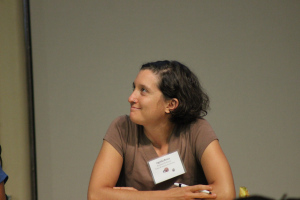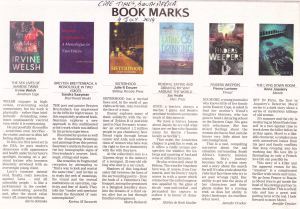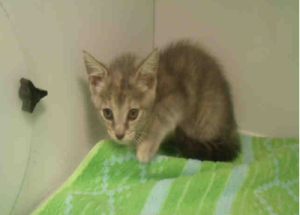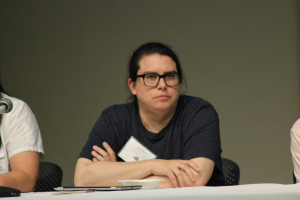Julie R. Enszer's Blog, page 34
September 4, 2014
Grief and Grieving
On Monday, August 25th, we had to put our beloved cat Liza (with a z) Lou to rest forever. I say beloved, but we had a difficult and conflictual relationship with Miss Liza (with a z). She came to us at about a year old as a feral cat from the streets of University Park. Granted, the streets of our suburban hamlet are not particularly hard-scrabble. Bucolic is more accurate. Shelby and Emma and I had seen the cat who became Miss Liza (with a z) for many weeks before she ended up under the tree where the beloved feeds the birds. We always joked that she chose us. She saw us with these big hunkering dogs and thought, well, certainly, they can afford to feed me. She also discerned the very best way to get into our home: threaten the beloved’s birds.
Just two weeks after we brought Miss Liza (with a z) into our home, there was a terrible storm and five day power outage in our neighborhood. It was sweltering so we decamped for the Residence Inn near the Baltimore airport. We had to get a two bedroom suite because still no one could share a room with Liza (with a z). She had a full bedroom and bathroom to herself. We felt she mocked us during the whole trip as we stumbled over each other in the living room and other bedroom. As it should be, as it should be, she mumbled.
For the first six months, it was all hissing and spitting with Miss Liza (with a z). She drew blood from everyone in the family at some point. She staked out the space under the bed and if anyone should approach it she let us know she was there and we were not to encroach on her. She mellowed though and eventually found a good space with the dogs and with us humans. The most loving thing she ever did is sleep next to me all night the first night I was home after my mother’s death.
Liza (with a z) became ill a week before and nothing could turn it around. We concluded it was renal failure and while a fighter and a pistol, she seemed ready to move on to hunting mice elsewhere.
Like all human people, I feel as though I have too much experience with grief. And it came rushing back after Liza’s death. When my sister died, I was twenty-five. The first year after was a bit of a blur, but I worked at a frantic pace, even as more friends were dying around me from complications of AIDS. When my mother died eighteen months ago, I was surprised at how much grief affected me. Working brought no relief. Then again in late August, those circles and circles of sorrow.
On Saturday, though, after Liza’s (with a z) passage, I realized, there was one thing that would bring me joy. Bliss, even. A kitten. And I realized there is absolutely no reason not to rescue a kitten immediately. After all, there are lots of kittens looking for homes. I cleared it with the beloved (who was more reticent). On Wednesday, I found our next “little squeaker.” A small dil tortoiseshell kitten. She is just two months and two pounds. She comes home tomorrow.
I know this will not erase the grief. It will continue. My mind and my body continue to work through the loss, but for now I’m excited for the “little squeaker” to come home–and happy that with this grief, with this grieving process, I can do something to lessen the pain.
Here is the “little squeaker” who will come home tomorrow:
Filed under: Uncategorized


August 31, 2014
Replacement Values
During 2009, the beloved said many times, the economy will improve eventually because people will be required to replace things. Cars will wear out, washing machines will die, clothes will become threadbare or at least unfashionable. It seems that the economy is rebounding. Slowly, but as a whole we are out of the doldrums of 2008, 2009, and 2010.
Consumer purchasing drives the US economy, a topic worthy of further exploration, but today I am thinking about two consumer purchases on my horizon. Two things that my mother bought me in the last years of her life are wearing out. One is my office chair. My mother did not directly purchase this for me, rather sent me money for a holiday to buy myself the chair. It is a basic office chair purchased from Staples, but it is a good office chair. Not one of the $100 ones that fall apart after a year. No bolts have fallen out of it. The wheels roll well. It is solid. It is now eight years old. The cushioning is flattened; the fabric is fraying. I spend a lot of time in this chair. I am thinking that I need to replace it. After many years of comfort, it is becoming uncomfortable. Yet I am reticent to replace it; it is something my mother bought me, and it made her happy to buy it for me. I told this to a friend and she said, so you want to be uncomfortable to hold on to something from your mother? That seems absurd. In fact, it makes perfect sense. My mother loved a bit of misery. I think it would charm her to know I am sitting in an uncomfortable chair in her memory.
The other item my mother bought for me in the last years of her life was my set of bath towels. We went to Macys together one year when she visited me in Maryland. She loved Macys. She loved buying things from Macys. I was happy to have a need she could fulfill. They are thick wonderful towels. We bought four bath towels and four hand towels. I’ve been using them for probably five years. They are starting to show signs of wear. A corner of one is discolored from the laundry. I do not know quite how that happened, but a little bit of gray in one corner. The fibers once soft and supple are hardening a bit from use and washing. The need to replace them is not imminent, but I am thinking it would be nice to have a new towel or two. I know these will give our household years of continued use: gym towels, Bikram yoga towels, then drying dogs, mopping up household spills. So I know replacing them does not mean discarding them, but still I pause before buying any new towels. I am not quite ready to give up the daily use of something my mother bought me, knowing that she will buy nothing else for me in my lifetime.
Eventually, I will make these two purchases and provide some more fuel to the US economy. For now, though, I am waiting, delaying, withholding my money. Not for frugality but for memory.
Finally, on the topic of replacement, words of advice about insurance. A friend and her family just lost everything in a house fire. Tragic, but they had a replacement value insurance policy. Make sure you do whether you are a renter or an owner. Replacement value makes a difference, my friends. Invest in yourself; it makes a difference.
Filed under: personal writing Tagged: chairs, insurance, mother, mourning, towels


August 24, 2014
Sinister Wisdom eNewsletter
Here is a reprint of the Sinister Wisdom eNewsletter, published on Friday. If you want to receive it directly in your inbox, subscriber on the left side of the page here: http://www.SinisterWisdom.org
For the full HTML, go here: http://us3.campaign-archive1.com/?u=25e4728bbc8585d94bbed9b57&id=179f147952&e=%5BUNIQID%5D
August 2014
Sisters,
Before fall begins, I want to update you on the great work of Sinister Wisdom and what to expect in the coming months.
Next Issue Sinister Wisdom 94: Lesbians and Exile
We have a gorgeous cover for Sinister Wisdom 94. Click here to visit our webpage for a special sneak peek of the new cover. Guest Editors Joan Nestle and Yasmin Tambiah selected two pieces of artwork for the cover. On the front cover is an image from Naina Ayya; on the back cover is an image from Dovey Dee. The gorgeous cover gives you some idea of the fantastic issue that will be winging its way to you soon. Enjoy this little tantalizing taste of what is in store for you with our October issue.
I expect Sinister Wisdom 94 to be in the mail to subscribers by the end of September. It can take up to four weeks for journals to reach your mail box, but everyone should have it by the end of October. If you copy doesn’t arrive by November 15th, email SinisterWisdom@gmail.com and I’ll send a replacement copy your way.
Raves for Sinister Wisdom 93
Sinister Wisdom 93: Southern Lesbian-Feminist Herstory 1968-94 has been selling like hotcakes and getting rave reviews from all quarters. Women write with praise: “So happy you have published this!” and “Great interviews and commentary, really brings the time frame and the issues together in an exciting way.”
Here is a brief piece I wrote about Sinister Wisdom 93, Behind the Issue. I’ve been writing regularly for Huffington Post; you can follow my blog at Huffington Post here. I try to infuse lesbian-feminism in the blogosphere when I have the time and inspiration.
We are nearly sold out of Sinister Wisdom 93: Southern Lesbian-Feminist Herstory 1968-94, so if you want a copy–or you want a copy to share with a friend, order it today. Once it sells out, it will only be available second-hand!
Missed an Issue? Subscription Not Acknowledged?
All of us at Sinister Wisdom work hard to ensure that you receive every copy of your subscription and that extra copies ordered of the current issue or any back issues are shipped promptly, usually within twenty-four hours. Mistakes happen, however! If your subscription doesn’t start on time or you miss an issue, please reach out and let me know. I mail out all of the individual web orders and review all of the subscription lists, but sometimes something falls through the cracks. Let me know any issues with payments, subscriptions, and orders; I want to resolve them in a timely manner and with extraordinary customer service.
New Features in the Sinister Wisdom eNewsletter
This Sinister Wisdom eNewsletter contains two new occasional features. First, a profile of a sister publication, Skin to Skin. Eboni Sade is the editor of Skin to Skin, and I interviewed her about the journal. I think Sinister Wisdom readers and eNewsletter subscribers will be interested in Eboni’s work.
Second, Sinister Wisdom volunteer Kelsey interviewed the cover artist from Sinister Wisdom 93, Robin Toler. They had a great conversation about feminism and art and artistic process.
I hope you enjoy these two new features. My goal is to offer compelling content in Sinister Wisdom and online – here in the newsletter, at www.SinisterWisdom.org, and on our Facebook page. For me, Sinister Wisdom is not only a journal, it is a journal that imagines and ignites lesbian revolution.
As always, share your thoughts with me about Sinister Wisdom at your convenience. It is a pleasure to be a sister steward for the journal at this moment.
In sisterhood,
Julie
Editor and Publisher, Sinister Wisdom

Interview with Robin Toler
Cover Artist for Sinister Wisdom 93: Southern Lesbian-Feminist Herstory 1968-94
Kelsey for Sinister Wisdom: The title to your work, Breathless, seems important to interpreting and understanding the piece. How do you think visual and written art are connected?
Robin Toler: This is an interesting question. Visual art and written art are interwoven. They help us make meaning out of our lives. They are, to a large degree, a big part of the creative experience which pivots around human self-expression. Images, words and language matter. The written art can bring clarity to visual art acting as a commentary on what we see. What we call things matters. How we individually and collectively experience things—especially political action– matters. When a woman makes art this is a political act; when she titles the work; this furthers her political power and is a commentary on what she has visually created. The title of this work is “Breathless.” I gave this work of art this title because it was how I imagined my personal experiences of being politically active in the south could be visually understood. Breathless is wild, expressive in shape and form and politically represents being in an active flow of energy.
“Breathless” embodies the highs of personal agency. Sometimes being a part of something political is one sure way to be taken seriously. When I engage in active political work there are beads of sweat on my forehead, sometimes my hands get dirty and my body shakes. This energy forms in between the spaces of my relationships with other people. My brothers, sisters, my work peers, my neighbors, my employers and my closest friends—everyone I know is affected when I engage in political work. Everyone has a need for subsistence and security, for freedom and community, we all want connection and meaning; we often strive for understanding and transcendence. Collective action brings us closer together. I feel rejuvenated in partnership with others. When I push up against something difficult, something socially unpopular, something on the wrong side of public opinion there is usually a back draft of sorts. This back draft is often a consequence of pushing up against some kind of ignorance or fear. When I take up a cause, it has magnitude and weight– personally and politically. Having an opinion as a woman –singly or collectively –ultimately has the potential to affect every area of my life.
You know that feeling? That feeling of being active, of being alive, of making an assertive choice, supporting an idea, expecting something different, being a feminist—taking a stand, taking responsibility for my actions and my passions. When I am in the thick of it, the energy begins to move all around me: where I can feel it in my gut when the energy drives me forward; helping me make choices and decisions that ultimately unpack additional sparks of consciousness. This is the same energy that speaks to me and helps me construct ever-evolving values and ideals. It is this same “breathless” energy that pushes me to nod my head and say yes where I can take another step and then another. This is an exhilarating feeling.
When I push hard politically—something happens. I am opened up to a surge of personal flow. The energy comes from somewhere and it pushes me forward; I get to move things, move ideas, move minds, move opinions and move ignorance and fear out of the way and push harder; then others begin to gather with me and they begin to push too. We become a movement; then the whole body of “us” begins to gain strength and insight as more energy builds and rises and builds on itself. And there we begin to confront others, sometimes forcing issues and asking deeper questions–shaking the trees looking for answers, for understanding and affirmation; this is where one feels exhilarated, stimulated and expanded. This is what I mean by “breathless”.
Kelsey for Sinister Wisdom: In your artist statement, you speak of art as “sacred and healing”. How do you think that art can be sacred and healing on both personal and collective/universal levels?
Robin Toler: Art is sacred and healing because art acts as a space holder—physically, emotionally and cognitively. Art is sacred and healing because it always references something bigger than itself. Art helps humans negotiate and transfer energy between worlds; art expands our level of consciousness. Art is sacred because it “holds” for us important transitional spaces allowing us to go in and out of different levels of consciousness allowing us to dip into and out of new ideas, concepts and processes. Art frees us to dance with unconscious material pulling it into consciousness increasing our understanding and helping us give our lives deeper meaning.
The art image in its visual, physical and spiritual form is a personal tool as well as a cultural tool. Art helps us create meaning out of what we see, experience, what we sense and imagine. As a healing power, art reflects, art restores and art redeems our humanness including our emotions, goals, desires, and passions as well as our disappointments, feelings, transgressions, frailties and disasters; art highlights our highs and lows in being human. Art can carve out our tensions and conflicts, allowing us to move through transitions, untangle our motivations and help us wrestle with our identities and relationships; art helps us solve human problems.
Art is polyvalent and stirs up our intuition and our instincts. Art holds up our ideas, clarifies our values and is a combination of multidimensional cultural facets—art is an idea, a dream, a concept, a loosely based segment of truth. This makes me think of Mary Daly, one of my personal role models. Mary Daly knew about sacred space and healing. Just as the prehistoric artist drew on cave walls to create an image of a successful hunt, art is used as a kind of “holding space”. The hunt was sacred because it meant life and death. Like the creators of Stonehenge, huge petroglyphs were placed in a circle where they created a kind of magic through and around that sacred space where other worlds were imagined. Art in cathedrals, churches, and nature holds the space and points to larger truths. This is what I mean by sacred. Healing is the mirroring of human need; this means desire, passion, imagination and sensual yearnings—healing leads us to close the gaps in our health, relationships and our material needs; healing is the immediate, progressive and ongoing long term removal of anxiety, depression, loneliness, grief and addiction and despair—art does this for us. Healing is the space between our conscious minds and our unconscious yearning, dreaming, and longing; art is about making unexpected connections between people, places and spaces. All art functions to bring us together, to make meaning and to help us feel more alive.
Kelsey for Sinister Wisdom: With vibrant colors, flowing lines, and great movement, Breathless seems like a work that is very much alive. Does this energy and spirit in your artwork relate to your understanding of art as a vehicle for political activism?
Robin Toler: Yes, yes, and yes. I am a politically active feminist and an artist. This is a special combination. My art at times serves a political purpose. Being a woman, an artist and a political minded feminist are all radical acts. There is within my character an unquenchable thirst for self-expression in many areas of my life. Creativity and being creative is a ravenous aspect of my personality. Sometimes, I am conscious of it and sometimes I am not conscious of anything except the next color I am about to use on my palette or the next political movement I am pushing up against—I am not sure what to call that! The creative art process just like the political process calls me to unpack something already there—like being political active—it is a pressure I feel in my bones to move, to do and to make my values and judgments known and when I can make art, I do that. I just create, just tap into the flow of the creative energy seeping up and emerging from the depths of who knows where that affects me–my being—it is some kind of creative calling I cannot ignore. Art is energy and the spirit of my art relates directly to understanding who I am as a political activist. The art of “Breathless” carries with it the hope of revitalizing those who are available to be called into a “movement”—to say yes, to go with the flow towards taking a stand, making waves and experiencing the vigor of creating and being political—taking the next right step and then feeling breathless over and over again. Ah, I love being an artist and a feminist!
Introducing Eboni Sade, editor of Skin to Skin
Julie for Sinister Wisdom: Tell me about Skin to Skin.
Eboni: Skin to Skin is a quarterly coffeetable magazine for women of the LGBT community. It encompasses poetry, prose, political essays and art/illustrations using the female body form as its backdrop. We promote unity and inclusiveness in the sharing of ideas.
Julie for Sinister Wisdom: What do you hope readers experience when they read Skin to Skin?
Eboni: I hope readers experience a community that embraces free thought and a sense of self when reading the featured writers and artists. And after reading Skin to Skin, I hope each reader feels compelled to submit work during the next submission cycle.
Julie for Sinister Wisdom: Tell me a story about why you publish Skin to Skin.
Eboni: I publish Skin to Skin for the inclusion of minority women, disabled women, and transgendered women. I wholeheartedly stand behind our tagline: “This is for the voiceless, the disheveled, the victims, the victors, the ones who are proud of their skin, and those who have not found its beauty yet.”
As a unit, we should be able to support one another in our efforts for freedom of speech and equality. By publishing Skin to Skin, I hope to continue that process.
Julie for Sinister Wisdom: How can readers purchase Skin to Skin?
Eboni: Readers can purchase back issues of Skin to Skin here: http://www.magcloud.com/browse/issue/748553
Julie for Sinister Wisdom: How can writers submit to Skin to Skin?
Eboni: Writers can submit through http://s2skin.com/skin-submissions or https://s2skin.submittable.com/submit
Filed under: Uncategorized


August 20, 2014
I am tired of the sun
It started a few weeks ago. The long summer days started wearing on me. Around 6 p.m. or 6:30 p.m., I am tired, I want the sun to sink down, I want to curl up on a cool evening with a book. I love the fall. The press of darkness encroaching earlier and earlier every day. The march to darkness. I love the fall. The holidays, the days of awe to pause and reflect while the sunlight lessens. Soon I will be pulling out jeans and wool socks and covered Birkenstocks. I love the fall.
It has been a productive summer, though. I polished up my third collection of poetry and am currently working on another poetry project that will also wrap up in the next few weeks. I completed a few scholarly articles. I took a few days off (and have a few more days planned!). Mostly, I am looking forward to those wool socks.
Here are a few links to things from the summer:
Two new poems, “Teshuva” and “The Day You Love Another Woman,” in Wilde Magazine.
Some other poems coming out this fall.
Some pieces over at The Huffington Post:
My Capricious Reading Habits, Authors Sustained Attentions
OutWrite DC: Creating New LGBTQ Literary Cultures
Rereading Cheryl Clarke’s First Poetry Collection: Narratives
Like my pieces at the Huffington Post blog? Follow me!
Oh, and I just found this review of Sisterhood. I’ve not read it yet. I always need a few days to work up to reading them. You can check it out and tell me if I should read it.
Be well. Darkness is coming.
Filed under: personal writing, poetry Tagged: poetry, summer, wool socks


August 10, 2014
Changing Contexts, Changing Meanings, and Poems
I am a huge fan of Danika’s reviews of lesbian books over at her blog, Lesbrary. I have been sending her copies of books published by Sinister Wisdom and delighting in her reviews of those books and her thoughts on lesbians book in general. I was pleased when she liked Sisterhood and somewhat crestfallen by her assessment of Handmade Love. Given my appreciation for Danika’s work, though, I take seriously her assessment of cissexism.
I don’t want to argue with her, nor defend myself. I absolutely understand her reading of the book and of the particular poems. I appreciate her critical apparatus that mobilizes her critique of these poems. What I do want to do is ask a few questions.
How do we as writers account for changing values and evolving analyses when our work, once published, becomes static, fixed in time?
I have seen other writers approach this by editing their work in future iterations based on feedback and critical engagement. This seems reasonable and like an important and viable response, but it still means that for some period of time, books are out there in the world circulating with the errors of an earlier age, even the reasonable words of an earlier age that have become errors through time and changing ideas, norms, and mores. Words that once were commonly used, acceptable, even in some cases desirable and preferable, become in our one short lifetime a slur or frowned on or not quite correct. How do we as writers recognize that fact and still keep on writing when we know that the words we commit to paper may change in short order? Not carry our intentions, our affections, our truths, and our passions out into the world?
Those are the questions that have been plaguing me since reading Danika’s review. How do I write today when I cannot know how people will read and think and speak in ten years let alone twenty, thirty, or forty years? I cannot dwell on those questions; to dwell is risk not writing. This seems to me the struggle: to write something that will capture meanings well into the future. Every poem cannot be a success, however. Sometimes we fail, in the moment and in a future that was unimaginable in one past.
I am thrilled about how the political contexts in which we think about and understand transgender have changed in the past decade and a half. I am thrilled about how much these meanings matter in all kinds of literary works. Those convictions combined with the commitment to write, to discover, even knowing that it may not be right and it may not last, bring me each day to the blank page. Criticism stings, but the balm is the pleasure of new, unimagined futures that reconfigure words, meanings, and politics and the delight of being a witness to it all.
Filed under: lesbian, personal writing, progressive activism Tagged: poetry, reviews, writing life


July 27, 2014
Bookstore News
I do not have a profound analysis of all of the recent news about bookstore, but I want to highlight a few developments and some recent news.
This post began a few months ago with a cranky note about a very good post from Paste Magazine, but I objected the the framing of “the last thirteen feminist bookstores.” What if these bookstores are the start of a new movement of feminist bookstores? The article seems to foreclose that possibility, preferring to see feminist bookstores as a remnant of a lost past, and anachronism, a business on the verge of extinction.
This article ran and was amplified on social media about the same time as reports that Marcus Books, the nation’s oldest African-American bookstore closed. The two seemed connected, but I struggled with what to say about the shrinking space of bookstores for readers and writers and all of us who care about having a vibrant literary culture.
Then, the announcement that Giovanni’s Room, the oldest gay bookstore, was closing and Melville House ran this very smart commentary that it did not have to close. A few months ago, it seemed I like the bad news would continue relentlessly.
Over the past few weeks, however, some glimmers of hope, maybe even change. Women and Children First, the venerable feminist bookstore in Chicago, sold to two employees. And Giovanni’s Room also found a new owner.
Some good news, if modest. It comes with some bad news, though. On Friday, Publishers Weekly reported that South End Press is in bankruptcy. And so it goes.
Even in the face of the good and the bad, I remain relentlessly optimistic about books and publishing and particularly queer, feminist publishing. I need the books that our independent bookstores and publishers sell; we all need these books. We must find ways to have them in the world in spite of the pervasive neoliberal capitalism that controls our lives currently. Writing, publishing, and believing in these unprofitable endeavors feels like one form of resistance. And resistance is always so vital.
Filed under: lesbian Tagged: capitalism, LGBT bookstores, LGBT publishing, publishing


July 21, 2014
Two Photos from Feminist Summer Camp
As I prepare to drive over to Chestertown, MD for the Poetry Salon at Washington College, two images from my earlier trip to Ohio State University for the Transnational Feminist Summer Institute. The first image is of me, looking thoughtful, I hope; the second is of my friend and collaborator Agatha Beins. We both had a fantastic time at what people colloquially called Feminist Summer Camp.
Listening to audience comments at the Transnational Feminist Summer Institute at OSU

Agatha Beins smiling at the conversation after the first day at the Transnational Feminist Summer Institute at OSU
If that was feminist summer camp, I’m now headed to poetry summer camp, and I’ll post photos from that experience later this week.
Filed under: Uncategorized


July 15, 2014
What I Will be Doing Next Tuesday. . .
I was getting excited about the Poetry Salon next Tuesday at Washington College, then a friend sent me this photo: 
My excitement increased.
On Monday night, I will drive over to Chestertown, MD for dinner with the poets and spend all day on Tuesday with folks thinking and talking about poetry. Then we will read for a public event. I am thrilled to be a part of this group and very much looking forward to the event next week.
I will post some reflections afterward, but just wanted to share the excitement–and the photo in advance.
Filed under: poetry Tagged: creative work, Jewish, poetry, readings


July 14, 2014
Sisterhood Reviewed in Cape Times, South Africa
While I am mourning the death of Nadine Gordimer, I am feeling fancy with my own connection to South Africa. Poet and critic, Moira Richards, reviewed my poetry collection, Sisterhood, in the Cape Times. Some days the world is large and lonely; other days, it is small and intimate.

Filed under: Uncategorized


June 17, 2014
Bad Advice

Now that I spend more time with young people in college, I find myself occasionally giving them advice about life, work, careers, things to read, experiences to have. Even as I dispense advice, I am skeptical about its utility. I fear that my advice will fall into the realm of bad advice, like some of the advice people gave me as a young woman. To ensure that I maintain my humility, honesty and frankness when talking to young people, I thought I would disclose and catalogue some of the bad advice I received as a young woman.
These pieces of advice, or sometimes ostensible wise counsel, are things that I remember, nuggets that I returned to more than once, things I thought might be true and struggled with how to respond to them, not only to the older people telling me these things but more importantly to myself.
I share them because they turned out to not be true and I wish I had not spent a moment more thinking about them in my life. This may be the bottom line: advice is given, but it need not be taken.
Some advice seems reasonable at the time while it is being given, but it may not work for the person to whom it is given. I wish I had discarded some of this bad advice earlier rather than later.
Now without further ado, bad advice I have received in my life:
1. “Think long and hard about having the word lesbian on your resume FOR THE REST OF YOUR LIFE.” This was in 1991 when I was thinking about taking a job at the gay and lesbian community center. I took the job. My resume has always had the word lesbian on it. It has been fine. This was much scarier to people of a different generation.
2. “Find a stable job and do the things you love as hobbies.” First, the number of people who can occupy the space of stable jobs is dwindling and may even be approaching zero. I received this advice in Michigan, though, where the best job someone could get was working for the car companies. Thirty years, then a full pension for the rest of your life. Except, well, that did not really work out for too well either. I never took that advice. I have always been paid to do the things I love.
3. “Children are the best thing that can happen to a woman, don’t be so obsessed with your work that you forget to have them.” For reals. People said that to me. I still have no words.
4. “Your major doesn’t matter and your grades don’t matter in ‘the real world’.” As you might guess, I am peevish about the entire notion of there being a real world outside of whatever world we are in now. Let’s set that aside though. This particular chestnut is spread every year at graduation. I see people’s point, but this advice did little to assuage my anxiety about either my major or my grades, and I do not think that it helps young people much today. In addition, I think these things do matter! Making the decision about a major forces us to define what is important to us intellectually and practically. Grades force us to examine our own behavior on a variety of registers to think about and understand what work we are willing to do and not do to succeed. Basically, I find this piece of advice useless pap, though it took me too long to arrive at that conclusion.
5. “At some point, dear, you will want to shave your legs and underarms.” Generally this involved finding a man to love me, but some people even told me that I would be so in love with a woman that I would want to shave for her. I love my wife, but it has not happened that I am so in love with her I wish to spend massive amounts of time removing perfectly good and unobtrusive hair.
Those are my top five examples of bad advice. What bad advice have you received?
Finally, I am sure that I am on occasion dispensing bad advice myself. I hope my young counselees know when to simply dismiss the ramblings of a crazed geezer.
Filed under: lesbian, personal writing, teaching Tagged: advice










